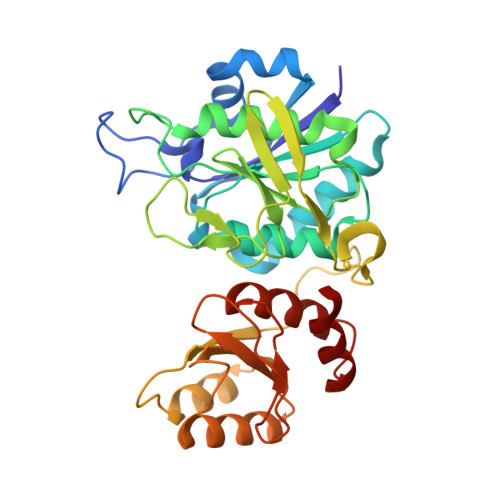Do bacterial L-asparaginases utilize a catalytic triad Thr-Tyr-Glu?
Aghaiypour, K., Wlodawer, A., Lubkowski, J.(2001) Biochim Biophys Acta 1550: 117-128
- PubMed: 11755201
- DOI: https://doi.org/10.1016/s0167-4838(01)00270-9
- Primary Citation of Related Structures:
1JSL, 1JSR - PubMed Abstract:
The structures of Erwinia chrysanthemi L-asparaginase (ErA) complexed with the L- and D-stereoisomers of the suicide inhibitor, 6-diazo-5-oxy-norleucine, have been solved using X-ray crystallography and refined with data extending to 1.7 A. The distances between the Calpha atoms of the inhibitor molecules and the hydroxyl oxygen atoms of Thr-15 and Tyr-29 (1.20 and 1.60 A, respectively) clearly indicate the presence of covalent bonds between these moieties, confirming the nucleophilic role of Thr-15 during the first stage of enzymatic reactions and also indicating direct involvement of Tyr-29. The factors responsible for activating Tyr-29 remain unclear, although some structural changes around Ser-254', Asp-96, and Glu-63, common to both complexes, suggest that those residues play a function. The role of Glu-289' as the activator of Tyr-29, previously postulated for the closely related Pseudomonas 7A L-glutaminase-asparaginase, is not confirmed in this study, due to the lack of interactions between these residues in these complexes and in holoenzymes. The results reported here are consistent with previous reports that mutants of Escherichia coli L-asparaginase lacking Glu-289 remain catalytically active and prove the catalytic roles of both Thr-15 and Tyr-29, while still leaving open the question of the exact mechanism resulting in the unusual chemical properties of these residues.
Organizational Affiliation:
Macromolecular Crystallography Laboratory, National Cancer Institute at Frederick, Frederick, MD 21702, USA.

















